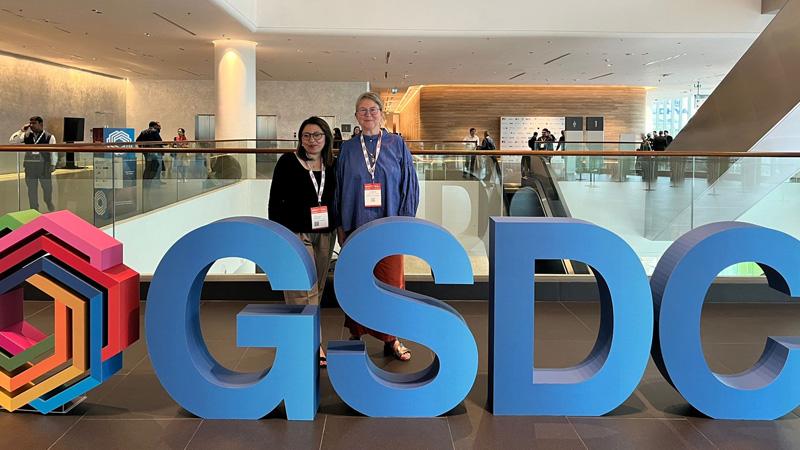Representatives from the University of Westminster were among the more than 3000 delegates at THE Global Sustainable Development Congress (GSDC) in Bangkok who first heard the public announcement of THE Impact Ranking 2024 results and contributed to lively discussions about the progress against the UN Sustainable Development Goals (SDGs).

Taking place between 10-13 June, the THE GSDC 2024 brought together 3,254 delegates from higher education, government, industry and society to discuss and share ideas for a sustainable future. This year, the majority of delegates came from the Global South, in sharp contrast with the 2022 Congress held in Glasgow, where there were only 300 delegates in attendance, the majority of whom came from the Global North.
At the Congress, Dr Pooja Basnett and Dr Ro Spankie , both influential sustainability leaders at the University and beyond, heard insights about the global progress toward the UN SDGs, also learning that the University of Westminster has been recognised as being in the top 15% universities globally, up from the top 20% last year.
The THE Impact Rankings measure a university’s teaching, research, stewardship and outreach against the UN’s 17 SDGs. Unlike some university rankings, all higher education institutions are eligible to enter, and the ranking currently includes 2,152 universities from 125 countries and regions across the globe.

Dr Pooja Basnett at a THE GSDC 2024 panel discussion
The Westminster delegates contributed their knowledge to the vibrant discussions at the Congress. Dr Pooja Basnett from the University’s School of Life Sciences was the moderator for the panel titled A Collective Effort on Research and Innovation Towards Global Restoration of Biodiversity. The discussion focused on the use of cutting-edge technologies in conservation, bridging the gap between scientific research and practical application, securing climate finance for conservation projects and leveraging corporate partnerships for biodiversity initiatives.
Dr Ro Spankie from the University’s School of Architecture + Cities spoke at the session titled Sustainable Urban Planning: How Are We Creating Cities for the Future? She explained that global warming and the resulting extreme weather events meant that people from across the world were living in infrastructures designed for disappearing climates. She suggested that we could not afford to rebuild, so we had to adapt our existing built environment and behaviour. Using London as a case study, she described how the introduction of ULEZ had improved London’s air quality, referencing the work of the University’s Active Travel Academy. She also discussed Professor Lindsay Bremner’s project Monsoon Assemblage which looked at the relationship between climate and culture.
Dr Spankie also spoke on the panel titled Shaping Healthy Futures: Effective Policy Pathways Driving Collaboration and Impact. This panel looked at the benefits of prevention rather than cure in modern health care, given that healthcare would be the fifth largest polluter in the world, if it was a country. She described an award-winning collaboration between the Architecture and Medical students from the University of Westminster and Imperial College London, which explores the relationship between design, mental health and well-being.

Dr Ro Spankie (second from right) at a THE GSDC 2024 panel discussion
As well as presentations and panel discussions the THE GSDC 2024 offered hands on workshops. Dr Spankie also enjoyed Uncle Ree’s Farm Upcycling Plastic Workshop. She recalled: “Sixteen global delegates, sitting around a table and ironing plastic bags into sketchbook covers allowed for a really expansive discussion and some dark humour. It had the atmosphere of an eighteenth-century women’s quilting party.”
Dr Basnett’s favourite highlight was meeting delegates from the Global South and hearing about all the amazing initiatives they are a part of or leading. She added: “One memorable moment was during the session From Dialogue to Action: Building a Sustainable Future Together. Sanjana Chhantyal, Project Lead of the Sustainable Development Solutions Network Youth from Nepal, said ‘No individual is too young or old to make a change for sustainable development. No university is too big or too small to strive for sustainable development.’ This message resonated deeply with me and will continue to inspire my work in sustainable development.”
Reflecting on the Congress, Dr Spankie said: “A Congress is a very different event to a Conference – the focus is collective debate rather than an individual’s discipline or research. With 3000+ delegates this event was truly global, and while the issues are geographically and culturally specific, the answer always relies on behaviour change.”
Dr Basnett said: "It was exciting to meet individuals with years of experience in the sustainability sector, but as an educator, what was even more encouraging was seeing young leaders from diverse backgrounds with full of innovative ideas and passion for sustainable development."
Learn more about Sustainable Development as a strategic priority at the University of Westminster, including the University’s latest Sustainable Development Goals report.


